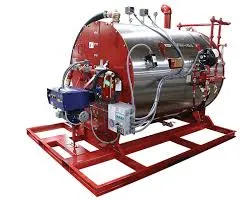
Oct . 15, 2024 10:36 Back to list
Monitoring and Optimizing Boiler Temperature for Enhanced Efficiency and Safety
Understanding Temperature Control in Boilers Importance and Mechanisms
The efficient operation of industrial boilers is essential for various processes, including power generation, heating, and many manufacturing operations. One of the critical parameters that dictate boiler efficiency, safety, and output is temperature control. This article delves into the importance of temperature regulation in boilers, how it is achieved, and the potential consequences of improper temperature management.
The Significance of Temperature in Boilers
Temperature control in boilers is vital for several reasons. Primarily, it ensures that the boiler operates within safe design limits. Exceeding these limits can lead to catastrophic failures, resulting in equipment damage, increased maintenance costs, and safety hazards for personnel. Moreover, maintaining optimal temperature levels influences the efficiency of the combustion process. An appropriately regulated boiler temperature ensures that fuel is combusted completely, thereby maximizing energy output while minimizing emissions.
In addition to efficiency and safety, the temperature directly affects the quality of the steam or hot water produced. In power generation facilities, the steam quality is crucial for driving turbines effectively, ensuring operational reliability and stability. In other applications, such as food processing or chemical manufacturing, the correct temperature is essential to achieve the desired product quality and consistency.
Temperature Control Mechanisms in Boilers
To achieve effective temperature regulation, modern boilers are equipped with various control mechanisms. These can be broadly categorized into feedback and feedforward control systems.
1. Feedback Control Systems These systems continuously monitor the temperature of the water or steam within the boiler. Sensors detect current temperatures and send this information to the control unit. If the temperature deviates from the setpoint, the control unit adjusts the fuel supply or water flow accordingly. This method ensures that any fluctuations are promptly corrected, maintaining the desired operational parameters.
temperature in boiler

2. Feedforward Control Systems Unlike feedback mechanisms, feedforward systems attempt to predict changes in temperature based on operating conditions. For example, if the fuel quality changes or the water supply temperature fluctuates, the system will adjust the fuel supply or air intake proactively, preventing undesired temperature shifts before they occur. This approach requires more sophisticated algorithms and sensors but can lead to improved response times and better stability in temperature control.
3. Advanced Technology Integration Many modern boilers incorporate advanced technologies such as artificial intelligence (AI) and machine learning algorithms. These systems analyze historical data, recognize patterns, and optimize control strategies. By learning from past behaviors and performance, these intelligent systems can enhance the efficiency of temperature control, reduce energy consumption, and respond dynamically to varying loads and conditions.
Consequences of Poor Temperature Management
Neglecting proper temperature control can have severe consequences. Operating a boiler at excessively high temperatures can lead to overheating, causing thermal stress and material fatigue, which may result in boiler failure. On the other hand, too low a temperature can prevent efficient energy generation and lead to incomplete combustion, generating harmful emissions and impacting environmental compliance.
Moreover, poor temperature control can lead to inefficient production processes, resulting in increased operational costs and reduced product quality. In industries where steam quality is paramount, such as in pharmaceuticals or food processing, inadequate temperature regulation can jeopardize compliance with industry standards and regulations.
Conclusion
In conclusion, temperature control in boilers is a critical aspect that directly influences the safety, efficiency, and effectiveness of boiler operations. Through the utilization of advanced control systems and technologies, industries can achieve precise temperature management, ensuring optimal performance. As the push for higher efficiency and lower emissions continues, understanding and mastering temperature control will be essential for the sustainable operation of boilers in the future.
-
High-Efficiency Commercial Oil Fired Steam Boiler for Industry
NewsJul.30,2025
-
High-Efficiency Biomass Fired Thermal Oil Boiler Solutions
NewsJul.30,2025
-
High Efficiency Gas Fired Thermal Oil Boiler for Industrial Heating
NewsJul.29,2025
-
High-Efficiency Gas Fired Hot Water Boiler for Sale – Reliable & Affordable
NewsJul.29,2025
-
High Efficiency Biomass Fired Hot Water Boiler for Industrial and Commercial Use
NewsJul.29,2025
-
High-Efficiency Biomass Fired Hot Water Boiler for Industrial Use
NewsJul.28,2025
Related PRODUCTS






















